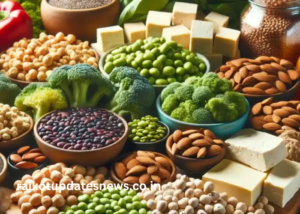
Protein is a fundamental macronutrient essential for the body’s growth, repair, and overall health. It plays a crucial role in building and repairing tissues, making enzymes and hormones, and supporting immune function. With the rise in popularity of fitness and health trends, understanding the significance of protein in our diets has never been more critical.
The conversation around protein is expanding beyond just athletes and bodybuilders; it now includes everyone seeking to maintain a healthy lifestyle. This article will delve into the topic of wellhealthorganic.com protein, exploring its various aspects, benefits, and sources to help you make informed dietary choices.
Key Points
- Protein is vital for tissue repair and muscle growth.
- There are various sources of protein, both animal and plant-based.
- Understanding your individual protein needs can optimize health and fitness.
What Is Protein and Why Is It Important?
Protein is made up of amino acids, which are the building blocks of life. The body requires 20 different amino acids to function properly, nine of which are essential and must be obtained through the diet. Protein serves several essential functions in the body:
- Building Blocks of Cells: Proteins are integral to the structure of cells, tissues, and organs. They make up muscles, skin, and hair, contributing to overall body composition.
- Enzyme Function: Many proteins act as enzymes, speeding up biochemical reactions necessary for digestion, metabolism, and other critical processes.
- Immune Support: Proteins are crucial for the production of antibodies, which help defend the body against pathogens.
In summary, protein is indispensable for overall health and wellness, supporting various physiological processes necessary for daily functioning.
How Much Protein Do You Need Daily?
The recommended dietary allowance (RDA) for protein varies based on several factors, including age, sex, and activity level. For most adults, the RDA is approximately 0.8 grams of protein per kilogram of body weight. However, active individuals and those looking to build muscle may require more. Here’s a breakdown of protein needs:
| Activity Level | Protein Requirement (grams/kg) |
| Sedentary Adults | 0.8 |
| Active Adults | 1.0 – 1.5 |
| Strength Training | 1.2 – 2.0 |
| Endurance Training | 1.2 – 1.4 |
Understanding your specific protein needs can help tailor your diet to support your health and fitness goals effectively.
What Are the Different Types of Protein?
Protein can be categorized into two main types: complete and incomplete. Understanding these categories helps in choosing the right sources for your diet.
- Complete Proteins: These contain all nine essential amino acids and are typically found in animal-based foods such as meat, poultry, fish, eggs, and dairy products. Examples include chicken breast, fish, and eggs.
- Incomplete Proteins: These lack one or more essential amino acids and are primarily found in plant-based foods like legumes, grains, and nuts. Examples include beans, lentils, and quinoa.
Combining different sources of protein can help ensure that you meet your amino acid requirements throughout the day.
What Are the Best Sources of Protein?
Incorporating a variety of protein sources into your diet is essential for optimal health. Here’s a comparison of some excellent protein sources:
| Source | Type | Protein Content (per 100g) | Additional Nutrients |
| Chicken Breast | Animal | 31g | B vitamins, phosphorus |
| Salmon | Animal | 25g | Omega-3 fatty acids, vitamin D |
| Eggs | Animal | 13g | Vitamin B12, selenium |
| Lentils | Plant | 9g | Fiber, iron, folate |
| Quinoa | Plant | 4g | Complete protein, magnesium |
| Tofu | Plant | 8g | Calcium, iron |
Including a mix of these sources can enhance your overall nutrient intake while meeting your protein needs.
How Does Protein Affect Muscle Growth?
For those looking to build muscle, protein is a critical nutrient. It helps repair and build muscle fibers that are damaged during workouts. When combined with strength training, protein intake can lead to muscle hypertrophy, or growth. Here’s how it works:
- Muscle Repair: After exercise, especially resistance training, the body needs protein to repair micro-tears in muscle fibers.
- Synthesis Rate: Consuming adequate protein stimulates muscle protein synthesis, which is crucial for muscle recovery and growth.
- Timing Matters: Consuming protein shortly after a workout can enhance recovery. A common recommendation is to aim for 20-30 grams of protein within 30 minutes post-exercise.
Incorporating protein-rich foods into your post-workout meals can maximize muscle growth and recovery.
What Are the Risks of Too Much Protein?
While protein is essential, consuming it in excessive amounts can have potential health risks. Here are a few considerations:
- Kidney Strain: For individuals with pre-existing kidney conditions, high protein intake may exacerbate their issues by putting extra strain on the kidneys.
- Dehydration: High protein diets can lead to increased urination, which may result in dehydration if fluid intake is not increased.
- Nutrient Imbalance: Focusing too heavily on protein may lead to insufficient intake of other essential nutrients, such as carbohydrates and fats.
Note: It’s crucial to strike a balance to ensure you’re getting a well-rounded diet.
How Can Vegetarians and Vegans Get Enough Protein?
For vegetarians and vegans, obtaining sufficient protein can be achieved through careful planning. Here are effective strategies:
- Diverse Plant Sources: Incorporate a variety of legumes, nuts, seeds, and whole grains to meet protein needs. For example, combining rice and beans provides a complete amino acid profile.
- Protein Supplements: Consider plant-based protein powders made from pea, rice, or hemp protein if you find it challenging to meet your requirements through food alone.
- Fortified Foods: Many products, such as plant-based milks and cereals, are fortified with protein to enhance their nutritional value.
With thoughtful planning, individuals following plant-based diets can easily achieve their protein goals.
What Are the Benefits of Protein for Weight Management?
Protein can play a significant role in weight management and can be beneficial for those looking to lose weight. Here’s how:
- Satiety: Protein-rich foods tend to be more filling, which can help reduce overall calorie intake. Consuming protein can lead to increased feelings of fullness, reducing the urge to snack.
- Thermic Effect: The body burns more calories digesting protein compared to fats or carbohydrates, known as the thermic effect of food (TEF).
- Muscle Preservation: Adequate protein intake during weight loss can help preserve lean muscle mass, which is crucial for maintaining metabolism.
Incorporating protein into your meals can support weight management while ensuring you feel satisfied.
How Does Protein Impact Recovery After Exercise?
Protein plays a crucial role in recovery following physical activity. Here’s how it aids in the recovery process:
- Tissue Repair: Consuming protein post-exercise aids in repairing damaged muscle fibers, reducing soreness and promoting faster recovery.
- Glycogen Replenishment: When paired with carbohydrates, protein can help replenish glycogen stores, which are essential for energy during workouts.
- Inflammation Reduction: Certain protein sources, particularly those high in omega-3 fatty acids like fish, can help reduce inflammation associated with intense workouts.
Ensuring adequate protein intake post-exercise is vital for optimal recovery and performance.
What Are Some Common Protein Myths?
Several myths surrounding protein can lead to confusion. Here are some common misconceptions:
- Myth 1: You can only get protein from meat. Reality: Many plant-based sources provide ample protein, including legumes, nuts, and whole grains.
- Myth 2: High protein diets are bad for your kidneys. Reality: For healthy individuals, moderate protein intake poses no risk; however, those with kidney issues should consult healthcare providers.
- Myth 3: More protein equals more muscle. Reality: While protein is important, muscle growth also requires strength training and adequate overall nutrition.
Note: Understanding the facts can help dispel confusion and lead to better dietary choices.
How to Incorporate Protein Into Your Diet?
Incorporating protein into your daily meals can be simple and enjoyable. Here are some effective tips:
- Start with Breakfast: Consider protein-rich breakfasts such as Greek yogurt with fruits, eggs, or protein smoothies.
- Snacking Wisely: Choose high-protein snacks like nuts, seeds, or protein bars to maintain energy levels throughout the day.
- Meal Planning: Include a source of protein in every meal, whether it’s chicken for lunch or lentils for dinner, to ensure you meet your daily requirements.
By making small adjustments to your meals and snacks, you can easily increase your protein intake.
What Are the Signs of Protein Deficiency?
Recognizing the signs of protein deficiency is essential for maintaining health. Here are some common indicators:
- Muscle Weakness: A lack of protein can lead to muscle loss and weakness, affecting overall strength and mobility.
- Slow Healing: Insufficient protein can impair recovery from injuries and wounds, as protein is crucial for tissue repair.
- Hair and Nail Issues: Protein deficiency can manifest as brittle hair and nails, as both are largely composed of proteins.
If you notice these symptoms, consider evaluating your protein intake and dietary habits.
What Are the Effects of Protein on Skin Health?
Protein also plays a vital role in maintaining healthy skin. Here’s how it affects skin health:
- Collagen Production: Collagen, a protein that provides structure to the skin, requires amino acids derived from dietary protein. Increased collagen can improve skin elasticity and reduce wrinkles.
- Healing Properties: Protein aids in the repair of skin cells and tissues, promoting healing from cuts and wounds.
- Overall Glow: A diet rich in protein can enhance overall skin appearance by supporting hydration and nutrient delivery to skin cells.
Ensuring adequate protein intake can contribute to healthier, more radiant skin.
How Can You Choose High-Quality Protein Supplements?
If you’re considering protein supplements, here are some tips for selecting high-quality options:
- Check Ingredients: Look for products with minimal additives and fillers. High-quality protein powders should primarily consist of protein sources.
- Consider Dietary Needs: Choose supplements that align with your dietary preferences, whether they are plant-based, dairy-based, or free from allergens.
- Read Reviews: Research brands and read reviews to ensure you’re choosing reputable products.
Note: Always consult a healthcare professional before starting any supplement regimen.
What Are the Environmental Impacts of Protein Production?
The production of protein, particularly animal-based sources, can have significant environmental impacts. Here are some considerations:
- Land Use: Livestock farming requires extensive land and resources, contributing to deforestation and habitat loss.
- Water Usage: Animal agriculture is water-intensive, raising concerns about water scarcity in certain regions.
- Greenhouse Gas Emissions: Livestock production contributes to greenhouse gas emissions, affecting climate change.
Choosing sustainable protein sources, such as plant-based options, can help mitigate these environmental effects.
How to Read Nutrition Labels for Protein?
Understanding how to read nutrition labels can help you make informed choices about protein sources. Here’s what to look for:
- Serving Size: Pay attention to the serving size listed, as protein content is often presented per serving.
- Protein Content: Check the total protein content per serving to ensure it meets your dietary needs.
- Quality of Ingredients: Look for high-quality ingredients and avoid products with excessive added sugars or unhealthy fats.
Note: Being informed about nutrition labels can empower you to make healthier choices.
Conclusion
Protein is an essential nutrient that plays a vital role in numerous bodily functions, from muscle growth to immune support. Understanding the importance of protein through insights from wellhealthorganic.com protein can help you optimize your diet and health.
Whether you’re an athlete, a busy professional, or simply someone aiming for a balanced diet, incorporating adequate protein can enhance your overall well-being.
FAQ’s
1. What are the main functions of protein in the body?
Protein supports tissue repair, enzyme function, and immune health.
2. How much protein do I need daily?
Most adults need about 0.8 grams of protein per kilogram of body weight, but this can vary.
3. What are complete proteins?
Complete proteins contain all nine essential amino acids and are found in animal products.
4. Can vegetarians get enough protein?
Yes, through a variety of plant-based sources such as legumes, nuts, and grains.
5. What are the risks of excessive protein intake?
Too much protein can strain kidneys, lead to dehydration, and create nutrient imbalances.
6. How does protein support muscle growth?
Protein helps repair and build muscle fibers after exercise, promoting muscle growth.
7. What are some high-quality protein sources?
Chicken, fish, eggs, lentils, and quinoa are all excellent protein sources.
8. How can I incorporate more protein into my diet?
Include protein-rich foods in every meal and opt for high-protein snacks.
9. What are signs of protein deficiency?
Muscle weakness, slow healing, and brittle hair/nails may indicate a protein deficiency.
10. How can I choose the best protein supplements?
Look for minimal additives, align with dietary needs, and read product reviews for quality assurance.


